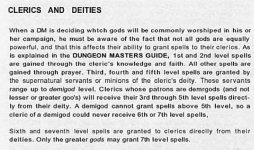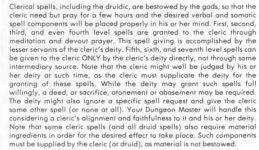You are using an out of date browser. It may not display this or other websites correctly.
You should upgrade or use an alternative browser.
You should upgrade or use an alternative browser.
D&D General What’s The Big Deal About Psionics?
- Thread starter Smackpixi
- Start date
James Gasik
We don't talk about Pun-Pun
"Any advanced form of technology is indistinguishable from magic."I still look at psionics as science.
Clarke's Law and all...
"Well, the reverse is true." -The Seventh Doctor, "Battlefield"
Yaarel
🇮🇱 🇺🇦 He-Mage
Actually, it turns out that the ability to gain spells is tied to Gods in 1e, here's a snippet from The Manual of the Planes:
Notice, these are not 1e core rulebooks.Oh and this from Deities and Demigods:
They are precisely 1e optional content, like Dragon magazines. I myself in my 1e group have never opted into these books. I have read the 1e Deities & Demigods, and saw its misrepresentation of Norse tradition. It never made its way to our table. I never read the 1e Manual of the Planes, and neither feel some need to. The 1e core books are sufficient for worldbuilding, and inspirations for a world can come from anywhere.
We know from the 1e Players Handbook and elsewhere, that the terms "god", "deity", and similar terms, are used improperly (and ethnocentrically) to mean any kind of sacred tradition of any culture.
In any case, to try treat 1e as if some kind of "canon" is to profoundly misunderstand what 1e is. The point of 1e is to create ones own world of imagination. Any 1e content is strictly there for inspiration to spark the imagination for things that one might want for ones own world. Even the conflictive rules and flavors in the rulebooks are to spark new ideas. Maybe your world has laser guns or vampires or both or neither. There is no sense of obligation. 1e prioritizes worldbuilding, and makes imagination truly free. Everything is to inspire new ideas. The 2e concept of a setting canon is alien to 1e.
Last edited:
James Gasik
We don't talk about Pun-Pun
We know from the 1e Players Handbook and elsewhere, that the terms "god", "deity", and similar terms, are used improperly (and ethnocentrically) to mean any kind of sacred tradition of any culture.
It seems more likely to me that either druid was shoe-horned in with cleric (in the parentheses) with little thought, that he hadn't thought about what he was writing in the section about what druids took as deities, or that nature itself was counted as a deity (I think there is something in Dragon supporting that last one by other authors). That would allow the parts about clerics themselves to be consistent as written and fit with the material in the supplements (Deities and Demigods and Manual of the Planes).
I've seen nothing besides the one sentence about druids that leads me to believe the 1e was open to the big tent philosophy/power source idea of 5e.
YMMV.
Yaarel
🇮🇱 🇺🇦 He-Mage
The 1e Players Handbook refers to normal trees as "deities", along with terms like "nature worship" and "nature priest" that actually worship trees. The 1e rules are clearly referring to animism, despite the ethnocentric misnomers that seriously misrepresent animistic cultures.It seems more likely to me that either druid was shoe-horned in with cleric (in the parentheses) with little thought, that he hadn't thought about what he was writing in the section about what druids took as deities, or that nature itself was counted as a deity (I think there is something in Dragon supporting that last one by other authors). That would allow the parts about clerics themselves to be consistent as written and fit with the material in the supplements (Deities and Demigods and Manual of the Planes).
I've seen nothing besides the one sentence about druids that leads me to believe the 1e was open to the big tent philosophy/power source idea of 5e.
YMMV.
James Gasik
We don't talk about Pun-Pun
It depends on the campaign setting, I know some Gods have Druids among their worshippers (Chauntea in the Realms does, though usually in her guise of the Earthmother). Greyhawk has a few nature deities as well.
This may or may not be how it works in Dragonlance (the material flipflops on whether Druids exist at all in the setting). There are also deities of the Prime Material Planes, like the Fey deities.
But in other places, Druids represent an older faith system, probably akin to worshipping animistic totem spirits like shamanism or shintao that are not tied to specific deities.
And then (to circle back to the threat topic), to make things more interesting, we have Psionic Gods. Just in the Realms we have:
This may or may not be how it works in Dragonlance (the material flipflops on whether Druids exist at all in the setting). There are also deities of the Prime Material Planes, like the Fey deities.
But in other places, Druids represent an older faith system, probably akin to worshipping animistic totem spirits like shamanism or shintao that are not tied to specific deities.
And then (to circle back to the threat topic), to make things more interesting, we have Psionic Gods. Just in the Realms we have:
- Auppenser: the sleeping deity of Jhaamdath with a focus on psionics
- Deep Duerra, a duergar demigod
- Deneir, the god of writing
- Ilsensine, the illithid god
- Laduguer, the chief god of the duergar
- Piscaethces, the Blood Queen, worshiped by aboleth
- Sseth, the sleeping god of the yuan-ti
- Sardior, the ruby dragon god of the gem dragons
Yes, it certainly does that for druids.The 1e Players Handbook refers to normal trees as "deities", along with terms like "nature worship" and "nature priest" that actually worship trees. The 1e rules are clearly referring to animism, despite the ethnocentric misnomers that seriously misrepresent animistic cultures.
In sections mentioning clerics it goes on more particularly about gods, and it is very specific in Deities and Demigods about it.
Hence my postulating that he was sloppy in trying to write about druids and clerics together (when he adds druids in parenthetically).
James Gasik
We don't talk about Pun-Pun
That last bit I got from page 40 even says "Clerical spells, including the Druidic, are bestowed by the gods". So while what gods are won't be talked about until the DMG, it's obviously they are important to the process.Yes, it certainly does that for druids.
In sections mentioning clerics it goes on more particularly about gods, and it is very specific in Deities and Demigods about it.
Hence my postulating that he was sloppy in trying to write about druids and clerics together (when he adds druids in parenthetically).
Shardstone
Hero
Ultimately, I want an elegant psionics system not only because I really like the idea of psionics as a concept, but because I'm bored of spells all the time. I want something a little different. I want a little extra spice. You don't have to like it. Ban it at your table. There are people who ban artificer too for flavor reasons from their tables. I know at least 4 tables that only use non-spellcasting classes and subclasses and run games in literal ancient Rome.
So, I want a Psychic or Psion or Mystic that has unique psionics mechanics that let me explore the themes in a new mechanical way. I don't really care to entertain the people who don't want that, because it'll be in a non-core book and you don't need to allow it at your table even if it is in a core book. That simple!
So, I want a Psychic or Psion or Mystic that has unique psionics mechanics that let me explore the themes in a new mechanical way. I don't really care to entertain the people who don't want that, because it'll be in a non-core book and you don't need to allow it at your table even if it is in a core book. That simple!
Similar Threads
- Locked
- Replies
- 3K
- Views
- 294K
- Replies
- 11
- Views
- 999
- Replies
- 17
- Views
- 5K
D&D General
Arcane Subclasses UA Survey is up
- Replies
- 52
- Views
- 13K
Recent & Upcoming Releases
-
June 18 2026 -
October 1 2026




